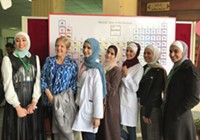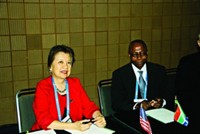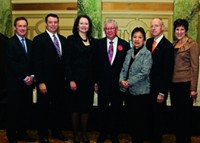Advertisement
Grab your lab coat. Let's get started
Welcome!
Welcome!
Create an account below to get 6 C&EN articles per month, receive newsletters and more - all free.
It seems this is your first time logging in online. Please enter the following information to continue.
As an ACS member you automatically get access to this site. All we need is few more details to create your reading experience.
Not you? Sign in with a different account.
Not you? Sign in with a different account.
ERROR 1
ERROR 1
ERROR 2
ERROR 2
ERROR 2
ERROR 2
ERROR 2
Password and Confirm password must match.
If you have an ACS member number, please enter it here so we can link this account to your membership. (optional)
ERROR 2
ACS values your privacy. By submitting your information, you are gaining access to C&EN and subscribing to our weekly newsletter. We use the information you provide to make your reading experience better, and we will never sell your data to third party members.
ACS News
ACS Strengthens Ties With Cuban Chemists
by Lori Brown, Special To C&EN
November 2, 2015
| A version of this story appeared in
Volume 93, Issue 43
Taking advantage of the warming relations between the U.S. and Cuba and building on the momentum of the ACS-Cuban Chemical Society joint symposium at the ACS national meeting in Boston in August, ACS members and staff participated in the Cuban Chemical Society’s QuimiCuba 2015 on Oct. 13–16.
The meeting, held in Havana, attracted more than 800 attendees from around the world, including representatives from Europe, the Americas, and Asia.

ACS was featured in several key events. ACS President Diane Grob Schmidt gave remarks during the opening ceremony, ACS took part in a panel discussion on U.S.-Cuba collaboration opportunities with members of the Cuban Chemical Society, and an ACS delegation met with officials at the newly reopened U.S. Embassy in Havana to discuss opportunities for work between the chemistry communities of the two countries.
In addition, on Oct. 13, ACS cosponsored a leadership dinner, which included leaders from the Cuban Academy of Sciences, the Latin American Federation of Chemical Associations, and the University of Havana.
Despite the logistical obstacles in working with Cuban scientists, ACS has found ways to maintain a positive relationship with the Cuban Chemical Society over the years. ACS Past-President Ernest Eliel (1992), who was educated at the University of Havana and worked in the U.S., worked passionately to connect the two societies. Other past-presidents have also traveled to the island nation despite challenges from the embargo.
Scientific exchange is among the most promising avenues for solidifying diplomatic ties, and the presence of ACS at events such as QuimiCuba 2015 is just one more step in normalizing relations between the U.S. and Cuba.
Announcements of ACS news may be sent to acsnews.cen@acs.org.





Join the conversation
Contact the reporter
Submit a Letter to the Editor for publication
Engage with us on Twitter